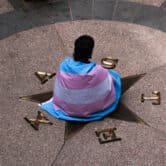MANHATTAN (CN) — New York City voted overwhelmingly Tuesday that they want ranked-choice voting in elections, one of five revisions to the City Charter that passed on Election Day.
The change to the City Charter means ranked-choice voting — also known as instant-runoff voting — will be implemented in 2021 for all city government primary and special election seats. The measure passed with more than 73% of the vote.
“Just voted here in New York — Ranked Choice Voting is on the ballot!” Democratic presidential hopeful Andrew Yang tweeted Tuesday night. “Ranked choice voting would let us express our true preferences and make our politics more dynamic and responsive. We should make it the norm throughout the country.”
The system allows voters to rank their top five candidates in order of preference. The person with the most top-ranked votes wins. If no candidate gets a majority, the lowest-ranking person is eliminated and his or her votes redistributed, until someone gets more than 50%.
The election makes New York the most populous jurisdiction with ranked-choice voting, seen as a progressive measure that could help first-time candidates and eliminate expensive runoff elections, in which poor and minority voters cast ballots in fewer numbers.
Opponents warned of unintended consequences. Democratic City Councilmember I. Daneek Miller, writing on behalf of the council’s Black, Latino and Asian Caucus, wrote in the New York Daily News that the measure could harm black and Latino candidates, if voters hedged to a “traditional” candidate as their second choice. The caucus urged all New Yorkers of color and those “interested in the fairness of your democracy” to vote no.
The ranked-choice process has been implemented elsewhere in the United States, including in Maine, San Francisco, Oakland, Minneapolis and St. Paul.
Tuesday’s election was also New York state’s first experience with early voting, introduced by the newly Democratic Legislature in January. The early-voting period, at 248 sites statewide, began Oct. 26 and ended Nov. 3, and attracted more than 250,000 million voters statewide, about a 2% overall turnout rate.
Just 1.14% of city voters went to the polls early — about 6,700 per day. The program was more popular Upstate. About 2.4% of voters outside the Big Apple turned out early, according to unofficial numbers. The final Sunday of the early period proved the most popular day to vote.
“I think it is more than fair to say early voting, by and large, went very smoothly,” said Robert Brehm, co-executive director of the state Board of Elections. “The voters seemed to like the convenience of not having to vote on just the one day.”
Public Advocate Jumaane Williams, who won Letitia James’ seat in a special election when she was elected state attorney general last fall, handily defeated Republican City Councilmember Joseph Borelli, garnering 78% of the votes with 90% reporting, and will finish out the term.
Queens Borough President Melinda Katz, who defeated progressive darling Tiffany Cabán earlier this year by a razor-thin margin in the Queens District Attorney Democratic primary, was elected over Republican-ticket challenger Joe Murray, a registered Democrat.
Mayor Bill de Blasio congratulated Williams and Katz in a tweet.
“Congratulations to @JumaaneWilliams and @MelindaKatz on their victories tonight,” he wrote. “I look forward to working with both of them to keep New Yorkers safe and make this the fairest big city in America.”
All five city charter revisions passed with 71% of the vote or more, with 90% of the votes counted. Another revision increases the size and power of the city’s police oversight watchdog, the Civilian Complaint Review Board, which makes determinations on the use of unnecessary force among other matters.
Overall turnout was predictably low Tuesday, since there were no state or federal races on the ballot. Next year’s presidential elections will be a much bigger test of the new system.
In 2020, there will be 27 days of New York early voting, according to the state Board of Elections — voting periods for the presidential primary, as well as state and federal primaries, and the general election, will last nine days each.
Subscribe to Closing Arguments
Sign up for new weekly newsletter Closing Arguments to get the latest about ongoing trials, major litigation and hot cases and rulings in courthouses around the U.S. and the world.








